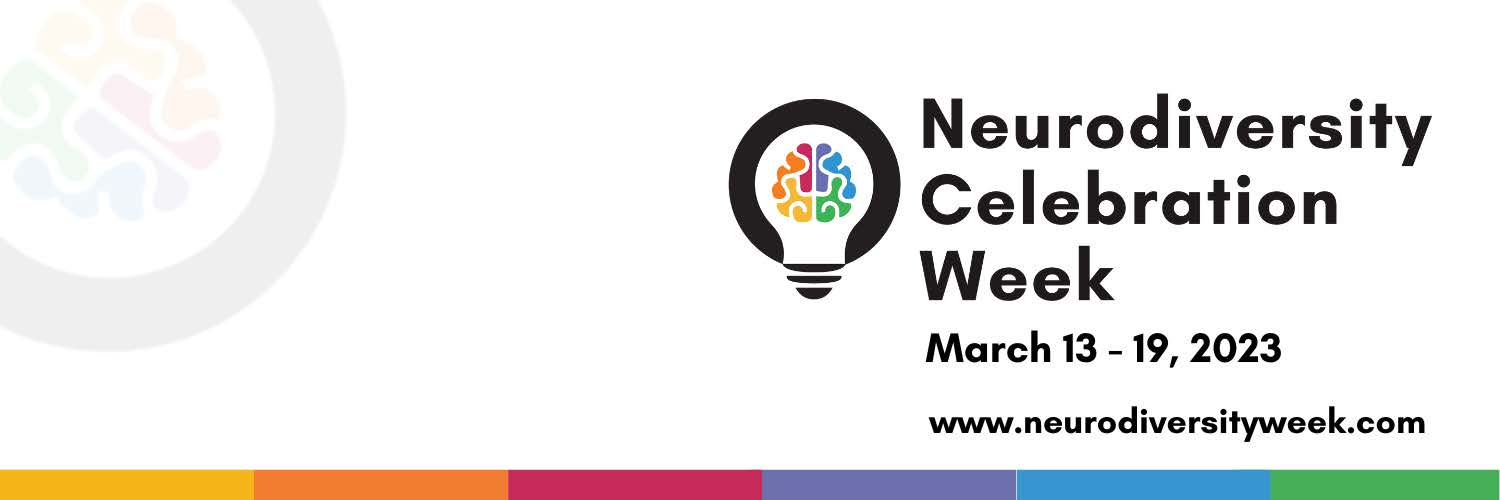Neurodiversity day celebration week
As part of our campaign to support Neurodiversity Celebration Week, we are looking at the talents neurodivergents can bring to the workplace. Although traits can vary, many neurodiverse individuals can have a diagnosis that overlaps, or relates heavily to other disabilities, especially aspects such as sensory issues. Being a diagnosed neurodivergent does not affect IQ or intelligence and there are many notable and successful neurodiverse people in the business world.
Disability Of the Day – Attention Deficit Hyperactivity Disorder (ADHD)
Although it can be diagnosed in childhood, many people who have ADHD reach adulthood before being diagnosed. Every individual with ADHD is unique, but some common traits include:
• Challenges controlling attention and impulse
• Fidgeting or moving while sitting down or concentrating
• Difficulty with organisation and short-term memory
• Switching from task to task
You don’t have to be an ADHD expert to be a supportive ally, friend, or colleague. Being empathetic, curious, and compassionate goes a long way.
Being aware of the support an individual with ADHD may require, can empower them in the workplace. when ADHD people feel supported and understood they can bring a whole host of talents to an organisation, including:
• New, original, creative, inventive, and outside-the-box ideas
• Courage and a sense of adventure in tasks
• A hyper-focused approach to getting projects and tasks done
• Elevated levels of social success: they can encompass social intelligence and humour
• Bring a great amount of energy, enthusiasm and motivation to a task and team
• Resilience in high-pressure situations
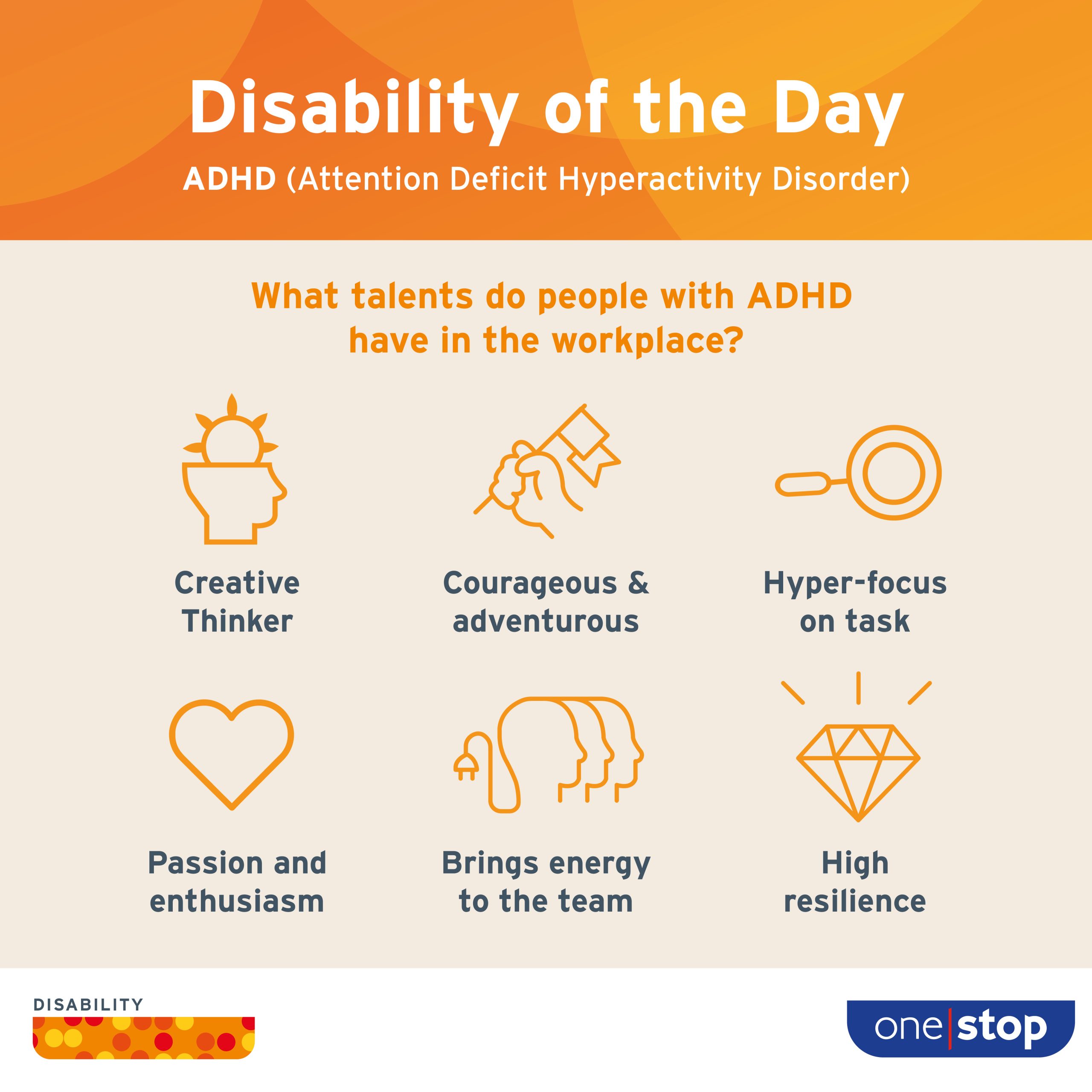
Disability of the day – Autism
Autism Spectrum Condition (ASC). Although it can be diagnosed in childhood, some autistic individuals reach adulthood before being diagnosed. Historically, it was believed that autism is more likely to be present in males, however, research shows that it is almost as prevalent in females, as females have a higher ability to hide their traits, which can cause great emotional distress. A great proportion of autistic women do not receive a diagnosis until adulthood. Every autistic individual experience is unique, with needs and supports varying, however, some common traits include:
- Misunderstandings and differences when communicating with peers (verbally and non-verbally)
- Over or under-sensitivity to sound light, taste, and smell
- Certain stimuli can be a source of distraction. Anxiety and difficulties processing, communicating, and reacting to a specific environment
- Difficulty understanding social cues
- Interpreting things at face value, taking things literally and inability to read between the lines or understand hints or ambiguous language
Being aware of the support an individual with ASC may require, can empower them in the workplace. Much of the autistic community often express a desire for others to learn how they communicate, double-checking what has been said, and checking for understanding rather than making assumptions. This is a great way to allow communication to improve and flow. When ASC people feel understood there are a whole host of talents they can bring to an organisation, including:
- Logical and detailed ideas
- Independent learning and thinking
- Highly visual thinking
- Reliable long-term memory
- Honest and direct feedback
- Non-judgemental listening skills
- Persistence, accuracy, attention to detail and technical ability
- Hyper-Focus – can concentrate for extended periods, especially on tasks that appeal to them
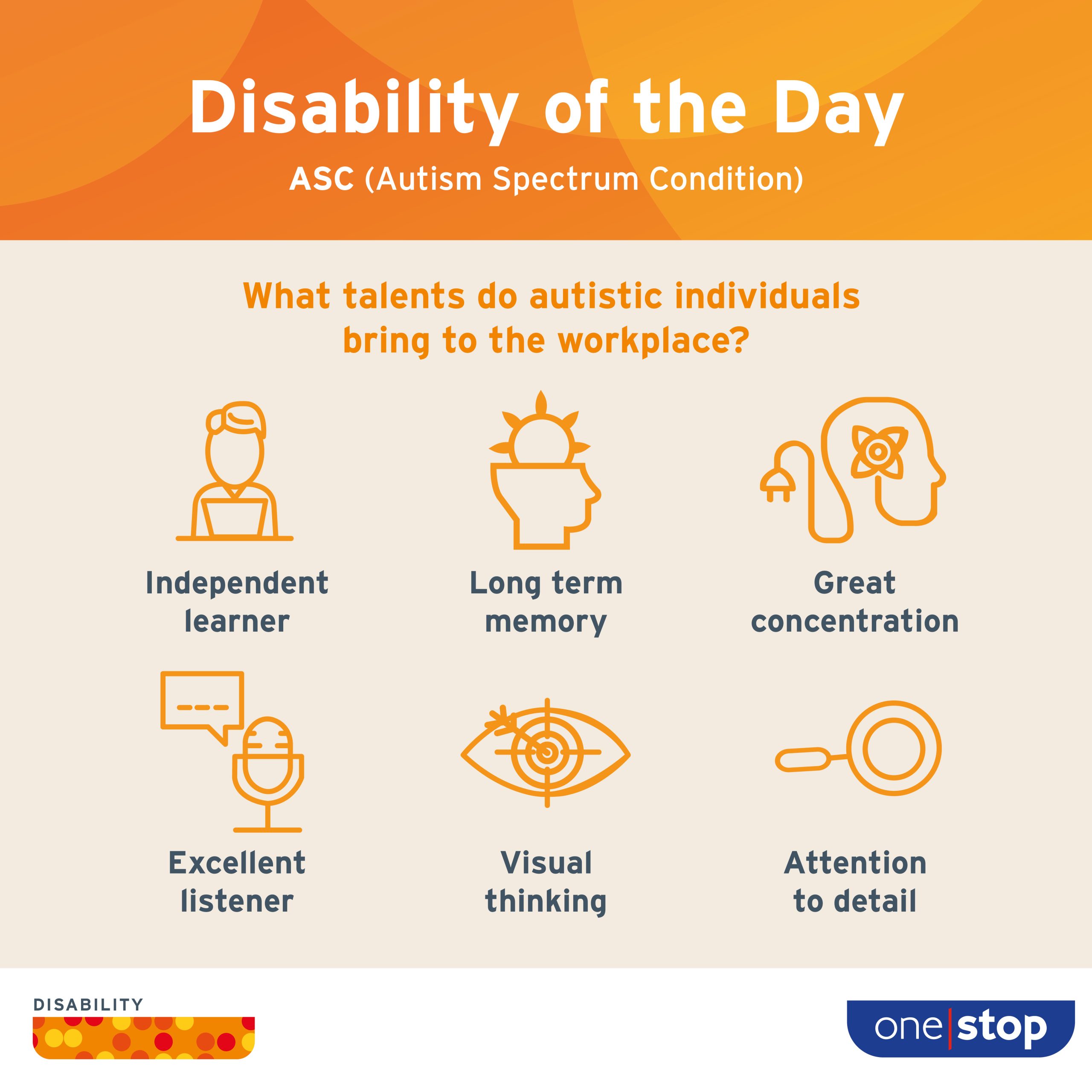
Disability of the day – Developmental Coordination Disorder/Dyspraxia (DCD)
Dyspraxia is a type of neurodivergence that affects the body and there are varying types of dyspraxia, such as verbal dyspraxia, however, DCD classically affects fine gross motor movements. It is mostly diagnosed in childhood, but many people who have DCD reach adulthood before being diagnosed:
Dyspraxia is a type of neurodivergence that affects the body and there are varying types of dyspraxia, such as verbal dyspraxia and DCD. DCD classically affects fine gross motor movements and is mostly diagnosed in childhood, but many people who have DCD reach adulthood before being diagnosed.
Every individual with DCD is unique, but some familiar challenges include:
- Co-ordination which can affect everyday activities such as tying shoelaces, balance, writing and playing sports
- Organisation and planning
- Working memory /short-term memory issues
- Time management
- Processing speed (audio processing disorder) ability to understand verbal instructions
- Following directions without visual aids
- Difficulty in understanding left and right
Being aware of the support an individual with Dyslexia may require, can empower them in the workplace. When people feel supported and understood, they can bring great value to an organisation, including:
- Being highly creative and bringing original ideas
- Seeing the bigger picture and having great problem-solving skills
- Be highly motivated, hard-working, and resilient
- Often approach tasks with self-discipline and enthusiasm
- Can be highly empathetic and sensitive
- Build strong relationships with people
- See things in a way that others cannot, therefore, offering a unique perspective and a creative way to bring effective solutions to problems
You don’t have to be an expert in Dyspraxia, offering patience, asking questions, and doing independent research can all help you to become a supportive friend, colleague, and ally.
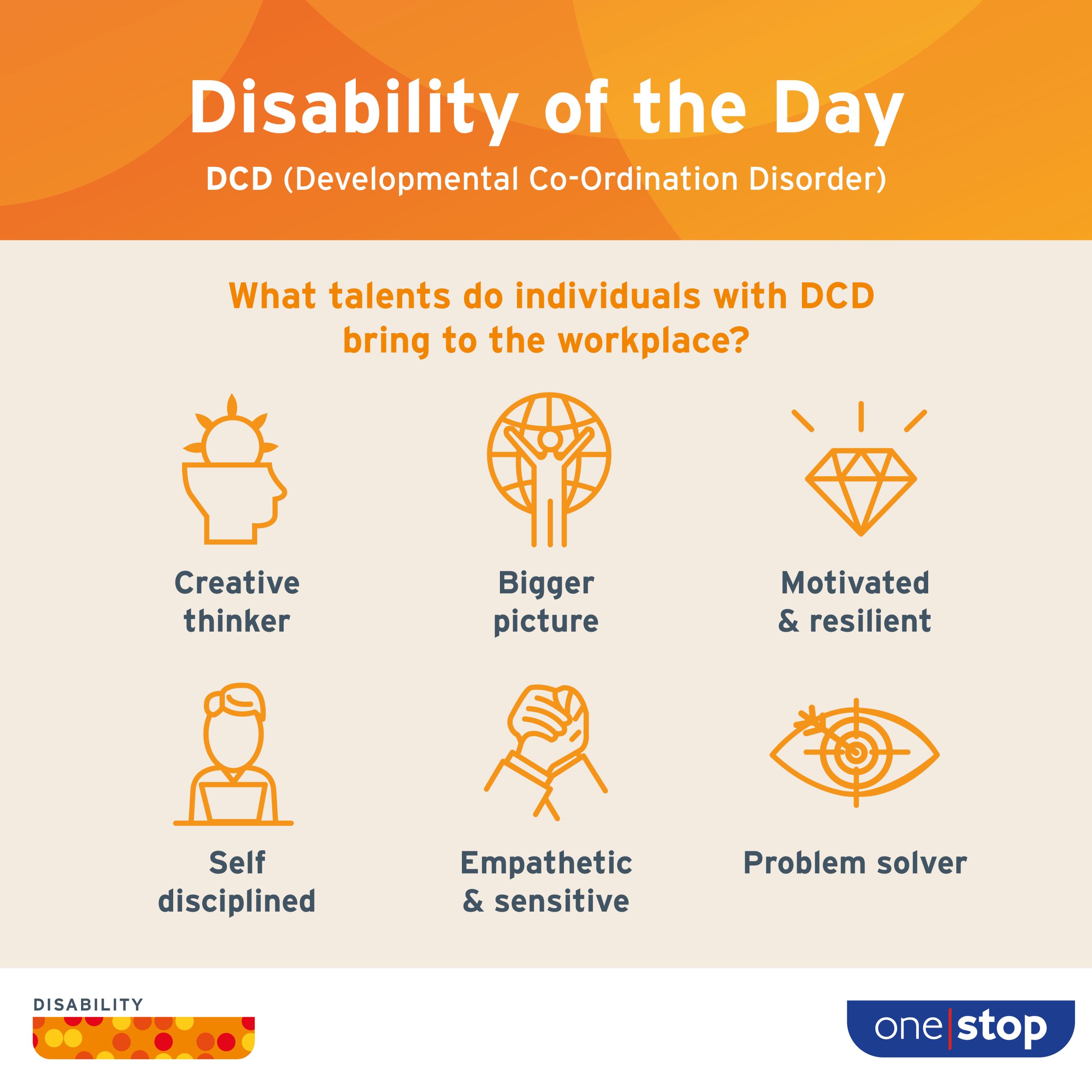
Disability of the day – Dyslexia
Dyslexia is a type of neurodifference present from birth. Although it can be diagnosed in childhood, many dyslexic individuals reach adulthood before being diagnosed. Every dyslexic individual is unique, but some common traits include:
- Challenges with reading, proofreading, writing, spelling, and processing new information
- Difficulties with short-term memory
- Being excellent at articulating themselves in meetings or presentations, but having difficulties getting ideas down onto paper in a structured way
- Working memory issues
Being aware of the support an individual with Dyslexia may require, can empower them in the workplace. When people feel supported and understood, they can bring great value to an organisation, including:
- Being highly imaginative and having a keen sense of curiosity and interest in new things
- Seeing the bigger picture and being great at solving complex puzzles
- Entrepreneurial skills because of an ability to think differently and connect different routes and thoughts
- Excellent critical thinking abilities and the ability to use logical reasoning in decision making
- The ability to be highly empathetic, build relationships and be a great conversationalist
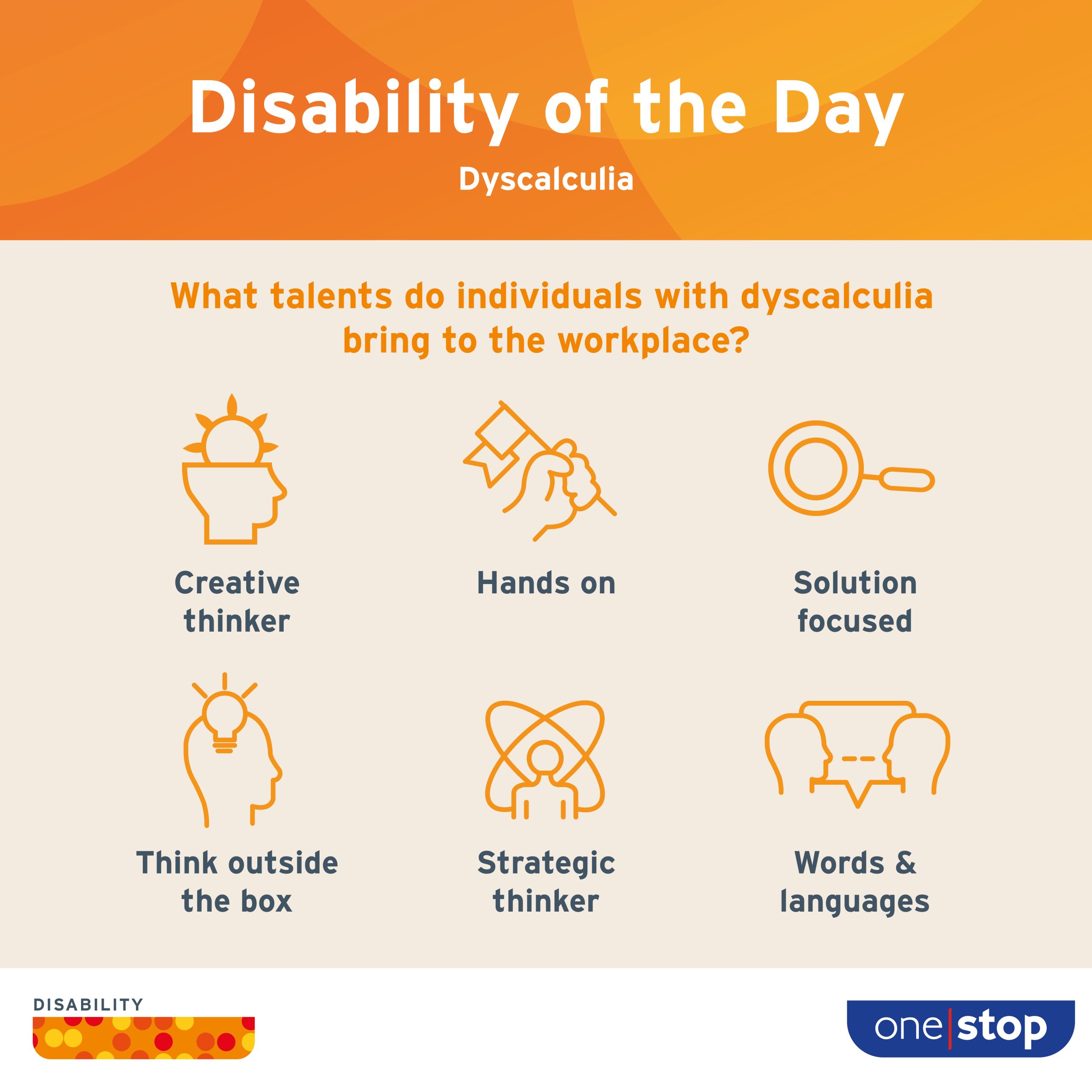
Disability of the day – Dyscalculia
Although it can be diagnosed in childhood, it is still a condition that can be missed, and many adults are not diagnosed until adulthood. Although every person’s experience with dyscalculia is unique, common traits can include:
- Struggling to understand simple number concepts and abstract concepts such as time and direction
- Difficulty in counting backwards
- Anxiety when dealing with everyday maths challenges such as dealing with money
- Short-term memory issues when learning facts about numbers
- Skipping or misreading numbers when reading from a long list
- Transferring numbers incorrectly from one document to another
Being aware of the support an individual with Dyscalculia may require, can empower them in the workplace. When people feel supported and understood, they can bring great value to an organisation, including:
- The ability to bring new and creative ideas to everything they do
- A hands-on approach to work
- A solution-focused approach to problem-solving
- Thinking outside the box
- Excellent strategic thinking and the ability to see situations holistically, i.e., they can identify critical elements instead of focusing on minor details
- Excellence in words and language
You don’t have to be an expert in Dyscalculia to be an ally, supportive friend, or colleague, offering patience, help and understating goes a long way.
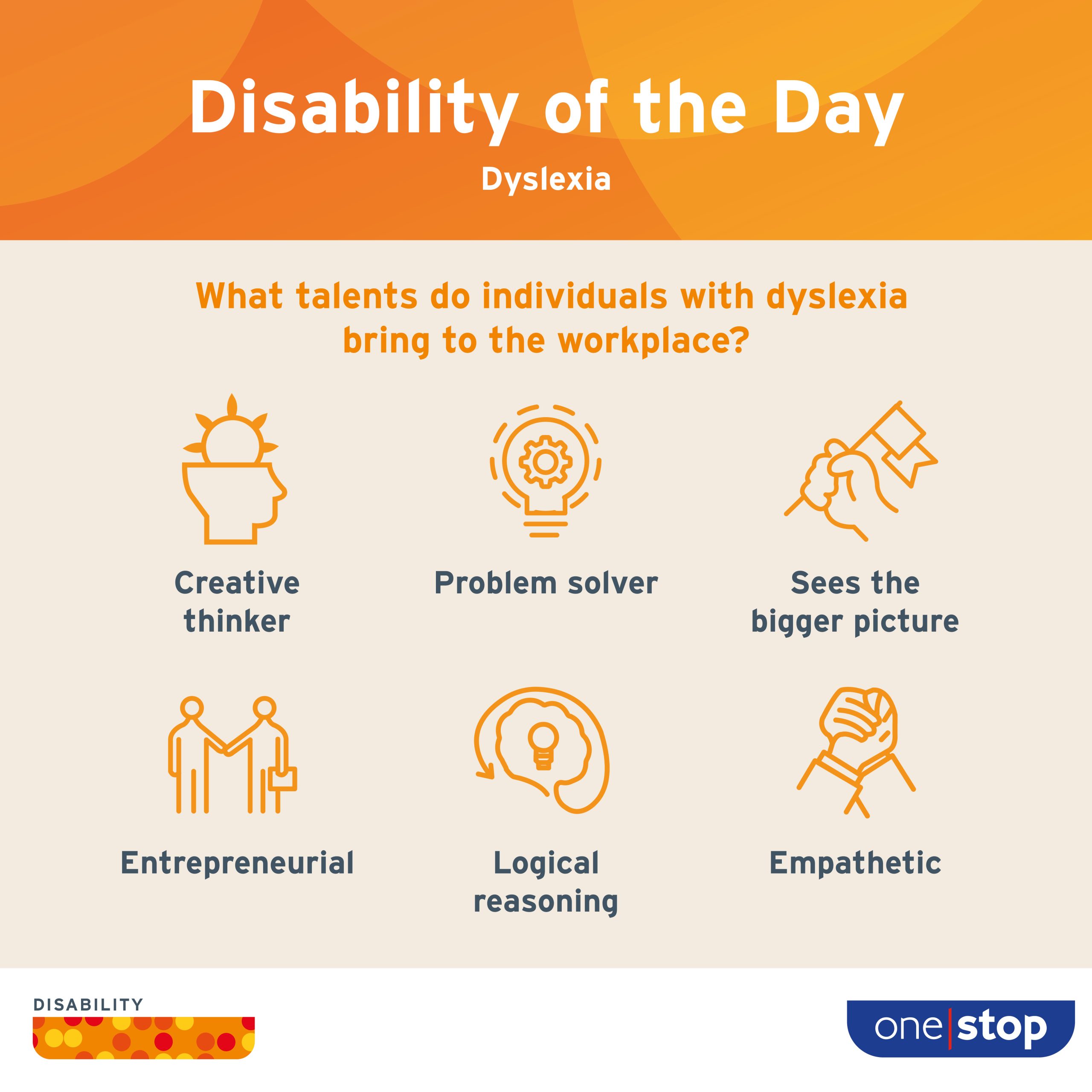
To join the disability network at One Stop email disabilities@onestop.co.uk and for more resources, you can read more here: https://www.neurodiversityweek.com/resource-hub
